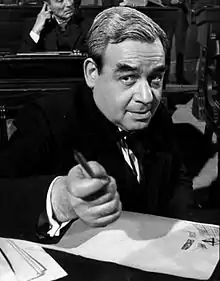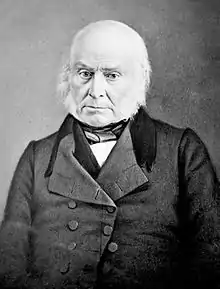Profiles in Courage (TV series)
Profiles in Courage is an American historical anthology series that was telecast weekly on NBC from November 8, 1964, to May 9, 1965 (Sundays, 6:30-7:30pm, Eastern). The series was based on the Pulitzer Prize winning 1956 book, Profiles in Courage by U.S. President John F. Kennedy, who had been assassinated the previous November.
| Profiles in Courage | |
|---|---|
 Tom Bosley as George W. Norris, 1965 | |
| Genre | Historical anthology |
| Based on | the book Profiles in Courage by John F. Kennedy (and Theodore C. Sorensen) |
| Directed by | Lamont Johnson Daniel Petrie José Quintero Michael Ritchie (film director) Alexander Singer |
| Theme music composer | Nelson Riddle |
| Country of origin | United States |
| Original language | English |
| Production | |
| Executive producer | Robert Saudek |
| Producer | Gordon Oliver |
| Camera setup | Single-camera |
| Running time | 44 mins. |
| Production company | Robert Saudek Associates |
| Release | |
| Original network | NBC |
| Original release | November 8, 1964 – May 9, 1965 |
Overview
The series lasted for 26 episodes, each of which would feature a figure from American history who took an unpopular stand during a critical moment in the nation's history. Seven of the eight senators from Kennedy's book were profiled, with the exception being Mississippi's Lucius Quintus Cincinnatus Lamar. Music for the opening and closing theme was arranged by Nelson Riddle, based on the Irish ballad, The Boys of Wexford, home of Kennedy's ancestors.
Historical background
Episodes
| No. overall | No. in season | Title | Directed by | Written by | Original air date | |
|---|---|---|---|---|---|---|
| 1 | 1 | "OSCAR W. UNDERWOOD" | Lamont Johnson | David Karp | November 8, 1964 | |
|
Opening narration: "...contender for the presidency. Another contender — Senator Oscar W. Underwood of Alabama — was so convinced the Klan was contrary to all principles of democracy that he wanted the Convention to denounce the Klan in no uncertain terms. His political courage would be tested during that fateful summer of nineteen-twenty-four."
"WALDORF–ASTORIA HOTEL 1924"
| ||||||
| 2 | 2 | "Mary S. McDowell" | Jose Quintero | Peter S. Feibleman | November 15, 1964 | |
| Starring Rosemary Harris | ||||||
| 3 | 3 | "Thomas Hart Benton" | Lamont Johnson | A. J. Russell | November 29, 1964 | |
| Starring Brian Keith | ||||||
| 4 | 4 | "Richard T. Ely" | Michael O'Herlihy | Walter Bernstein | December 6, 1964 | |
| starring Dan O'Herlihy | ||||||
| 5 | 5 | "Sam Houston" | Sherman Marks | A. J. Russell | December 13, 1964 | |
| starring J. D. Cannon | ||||||
| 6 | 6 | "Governor John M. Slaton" | Robert Gist | Don Mankiewicz | December 20, 1964 | |
| Starring Walter Matthau | ||||||
| 7 | 7 | "JOHN ADAMS" | Robert Stevens | Walter Bernstein | December 27, 1964 | |
|
Opening narration: "The British sentry was startled by the alarm of a fire that did not exist. Whoever had instigated this prank, confusion it caused was a prolog to other events that same night... events later to be known as the Boston Massacre."
"In the early months of seventeen-seventy, British soldiers were stationed in Boston for the first time. Their purpose — to enforce the English revenue laws in the colony. The colonials considered military occupation one of many grievances. Some colonials banded together in rebellious groups, such as the Sons of Liberty. The colonials were further angered by this sign, posted on the night of March fifth, which purported to announce the Redcoats' determination to repulse any opposition. Sometimes this opposition took the form of children's pranks and sometimes it was the harassment of individuals."
| ||||||
| 8 | 8 | "ROBERT A. TAFT" | Jose Quintero | William Hanley | January 3, 1965 | |
|
Opening narration: "Not all men were joyful, however... not all were capable of celebration.... nor had remaining to them the capacity for joy. Those who survived the charnel pit that was Nazi Germany, survived a new kind of war — a war of enslavement, murder, extermination, genocide... and the victims of that war fell on this battlefield — death from controlled gas warfare... in numbers beyond the ability of the mind to grasp. But who can truly imagine six million dead? The brain becomes useless and it remains to the heart and the soul to contend with such a truth. And what of the men responsible for the Holocaust? Were they men, like you and me? Perhaps... Not supermen... ordinary men... ordinary, but in whose hands there had been power... that it required little more than a single year to compile and catalog and broadcast to the world from this courtroom in Nuremberg, Germany, the full terrible truth of the system that these men had dreamed of... in a nightmare dream to be the Thousand-Year Reich and that was ended in twelve. The fire of madness that burned in these men's souls and consumed them and they stood now on the edge of judgment. While in America in that September of nineteen-forty-six, the people were preparing for a far different kind of judgment — in the first peacetime elections in eight years. There was a man then in Washington who was directly involved in the one judgment that would hopefully result in the political dominance of his party in the United States Congress... and who felt a responsibility for the nature of the other judgment that would in all likelihood result in the deaths of the men in the Nuremberg dock. Shy, reticent, solitary man, with few intimate friends, but with many followers. A man who had reached a place of power in the United States Senate... the acknowledged leader of his party. In the few years since his arrival in Washington in nineteen-thirty-nine as senator from his native state of Ohio... called Mister Republican... the son of the twenty-seventh President of the United States and with the dream that was almost a conviction... that he himself would one day have the honor of holding that office. But he was soon to risk the loss of his place of eminence in American domestic politics. And, he was to risk, too, the condemnation of the American people. Both, because he was a man who refused to make any slightest compromise with what he believed to be the truth."
Closing narration: "The storm raised by Senator Taft's speech eventually died down. It did not, after all the uproar, appear to affect the Republican sweep in nineteen-forty-six nor was it, at least openly, an issue in Taft's drive for the presidential nomination in nineteen-forty-eight. Taft's action was characteristic of the man who was labeled a reactionary and who was proud to be a conservative and who showed unhesitating courage in standing against the flow of public opinion for a cause that he believed to be right."
| ||||||
| 9 | 9 | "Anne Hutchinson" | Cyril Ritchard | Jonathan Miller | January 10, 1965 | |
| Starring Wendy Hiller | ||||||
| 10 | 10 | "General Alexander William Doniphan" | Unknown | Don Mankiewicz | January 17, 1965 | |
| Starring Peter Lawford | ||||||
| 11 | 11 | "John Peter Altgeld" | Daniel Petrie | Philip S. Goodman | January 24, 1965 | |
| Starring Burgess Meredith | ||||||
| 12 | 12 | "FREDERICK DOUGLASS" | Sherman Marks | Don M. Mankiewicz | January 31, 1965 | |
|
"NEW BEDFORD MASSACHUSETTS 1838"
"NEW BEDFORD MASSACHUSETTS 1841"
| ||||||
| 13 | 13 | "DANIEL WEBSTER" | Robert Gist | A. J. Russell | February 7, 1965 | |
|
"LONG ISLAND 1849"
Closing narration: "Daniel Webster suffered many abuses for his stand for the Union and his own political ambitions were thwarted. But, the fact that Secession did not occur until ten years later, is due in great part to him. He helped the country understand and accept Henry Clay's Compromise."
| ||||||
| 14 | 14 | "WOODROW WILSON (episode title does not appear on-screen)" | Alexander Singer | David Karp | February 14, 1965 | |
|
"January 4, 1916"
"THE DETROIT FREE PRESS on the appointment of Louis Brandeis January 29, 1916..."
| ||||||
| 15 | 15 | "Prudence Crandall" | Andrew Singer | Andy Lewis | February 21, 1965 | |
| Starring Janice Rule | ||||||
| 16 | 16 | "Andrew Johnson" | Alexander Singer | Philip S. Goodman | February 28, 1965 | |
| Starring Walter Matthau | ||||||
| 17 | 17 | "Hamilton Fish" | Unknown | Unknown | March 7, 1965 | |
| Starring Henry Jones | ||||||
| 18 | 18 | "Charles Evans Hughes" | Unknown | David Karp | March 14, 1965 | |
| Starring Kent Smith | ||||||
| 19 | 19 | "Edmund G. Ross" | Gerald Mayer | Andy Lewis | March 21, 1965 | |
| Starring Bradford Dillman | ||||||
| 20 | 20 | "George W. Norris" | Unknown | Don Mankiewicz | March 28, 1965 | |
| Starring Tom Bosley | ||||||
| 21 | 21 | "Grover Cleveland" | Lamont Johnson | Philip S. Goodman | April 4, 1965 | |
| Starring Carroll O'Connor | ||||||
| 22 | 22 | "John Quincy Adams" | Michael Ritchie | Andy Lewis | April 11, 1965 | |
| Starring Douglas Campbell | ||||||
| 23 | 23 | "John Marshall" | Unknown | David Karp | April 18, 1965 | |
| Starring Gary Merrill | ||||||
| 24 | 24 | "Judge Benjamin Barr Lindsey" | Robert Gist | Don Mankiewicz | April 25, 1965 | |
| Starring George Grizzard | ||||||
| 25 | 25 | "George Mason" | Joseph Anthony | A. J. Russell | May 2, 1965 | |
| Starring Laurence Naismith | ||||||
| 26 | 26 | "Thomas Corwin" | Michael Ritchie | Don Mankiewicz | May 9, 1965 | |
| Starring George Rose | ||||||
Awards
The series won two awards; a Peabody Award for Robert Saudek and a Directors Guild of America Award for Outstanding Directorial Achievement in Television.
External links
Episodes of Profiles in Courage on the Internet Archive

